10. State and Main
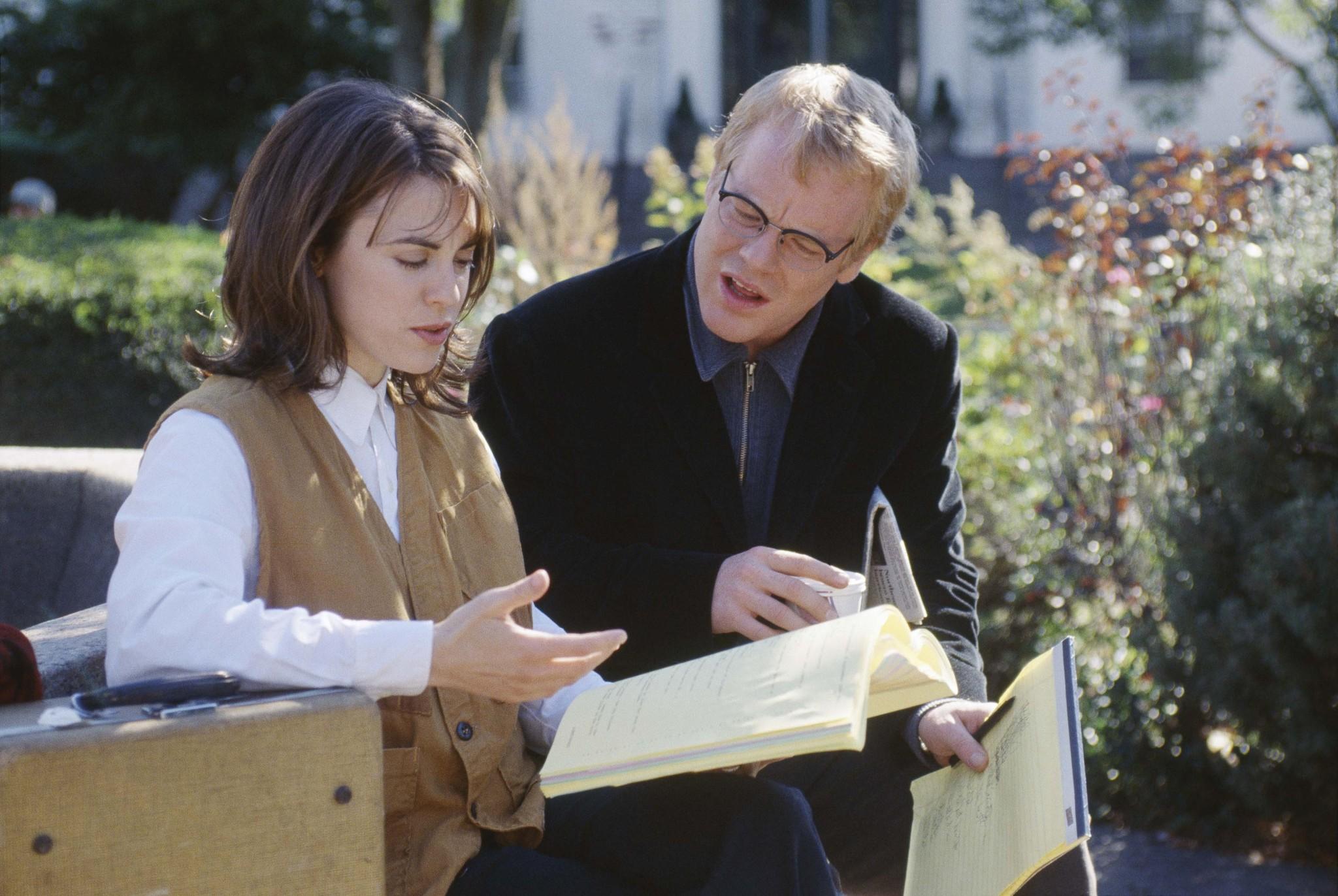
“State and Main”, both written and directed by Mamet, is certainly his lightest film. It involves a movie crew wreaking havoc on a small town in Vermont; it’s interesting because Mamet has often criticized Hollywood, and this film is his ultimate cinematic assault on the industry. Even so, the film never feels overly bleak or mean-spirited. The film has a lot of bite but a lot of charm as well. Mamet clearly had a lot of fun ridiculing Hollywood, and it seems that his all-star cast is having a lot of fun as well.
We have Philip Seymour Hoffman as the naive and good-hearted screenwriter, the heart of the film as he falls for a local woman (played again by Mamet’s wife, Rebecca Pidgeon). William H. Macy steals the show as the frustrated director dealing with all the egos around him. There is a perfectly cast Alec Baldwin as a narcissistic film star, possibly making fun of his own troubling behavior on the set of “The Edge”.
David Paymer plays a powerful film producer, playing opposite to his usual dweebish roles. The late great Charles Durning plays the mayor of the town and is always a joy to watch. The rest of the great cast includes Sarah Jessica Parker as a perky and simple-minded star; Mamet’s reliable magician Ricky Jay; and Clark Gregg, who would become even more famous for involvement in “The Avengers” and ultimately “The Shield”.
From all Mamet’s directorial pieces, this is his only full-blown comedy. It’s one of the finest satires of Hollywood, but it’s done with a delicate edge and a lot of fun. It’s another testament to Mamet’s multifaceted talent; his ability to juggle various genres in his own unique style.
9. Edmond
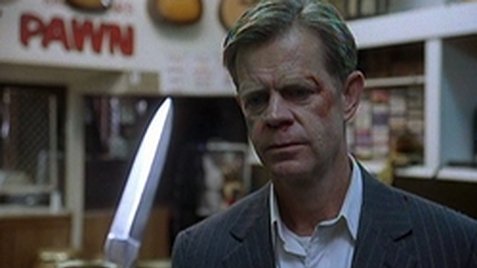
Stuart Gordon, who is most famous for his 80’s horror flicks “Re-Animator” and “From Beyond”, seems like an unlikely choice to adapt Mamet’s screenplay (from his own play), but he does a great job with the material. He even manages to bring out of the finest performances from lead William H. Macy. Macy is in every scene of the film, and the film hinges on his performance as frustrated middle-aged businessman Edmond Burke and his dark journey of self-discovery.
The film, however, received mixed reviews, but this isn’t at all surprising, as we watch the film through the eyes a racist white-collar businessman. The play itself has garnered lots of controversy and has even been unfairly criticized as being misogynistic and racist. The critics of this film have been no less harsh, but as often is the case, those critics seem to miss the point.
The screenplay might leave the judgment of its character to us, but it never glamorizes or condones his racist tirades. If that isn’t enough, his eventual actions and resignation of his fate should be proof enough that both the director and screenwriter do not consider Edmond to be a hero in any way.
Edmond Burke coldly leaves his wife (played again by Rebecca Pidgeon), feeling unfulfilled by his life and heads into the night, seeking fulfillment of some sort. Being exposed to the dark creatures of the night, Edmond falls deeper and deeper into his abyss until he is unable to ever return to his former life.
The film is filled with memorable cameos; from Mamet regular Joe Mantegna as a sympathetic and racist barfly; Menu Suvari as a desirable call-girl; George Wendt as a Russian pawnshop owner; Jeffrey Combs as a rude desk clerk; Bokeem Woodbine as an unlikely lover; and most memorably, Julia Stiles as a mentally ill waitress and actress. Each character brings Edmond closer to his unusual fate, and it starts with a fortune teller warning him that he isn’t where he belongs.
In his need for fulfillment, a barfly advises him to get laid. A call girl demands him to go out and get more money. In the night, a rude desk clerk adds to his seething frustration of the world around him. A pawnshop owner pawns him a sharp blade. When he finally unleashes his frustrations upon a sordid pimp, he begins to turn manic. Finally, a waitress/actress becomes his final ticket to hell. And in hell, he finds companionship with the last person he ever suspected.
Like many of Mamet’s works, he asks about what it means to be a man. Should a man subdue his true savage nature and wear a business suit to blend in with the rest of the world? Or should he unleash his real nature, even if it means being locked in a cage? It is indicative our need for companionship and understanding, and the loneliness of living in a big city.
Once you find someone who does understand you, even for a moment, the world finally seems to make sense. Yes, it’s deeply uncomfortable, but above all, it’s absolutely unforgettable.
8. Hoffa
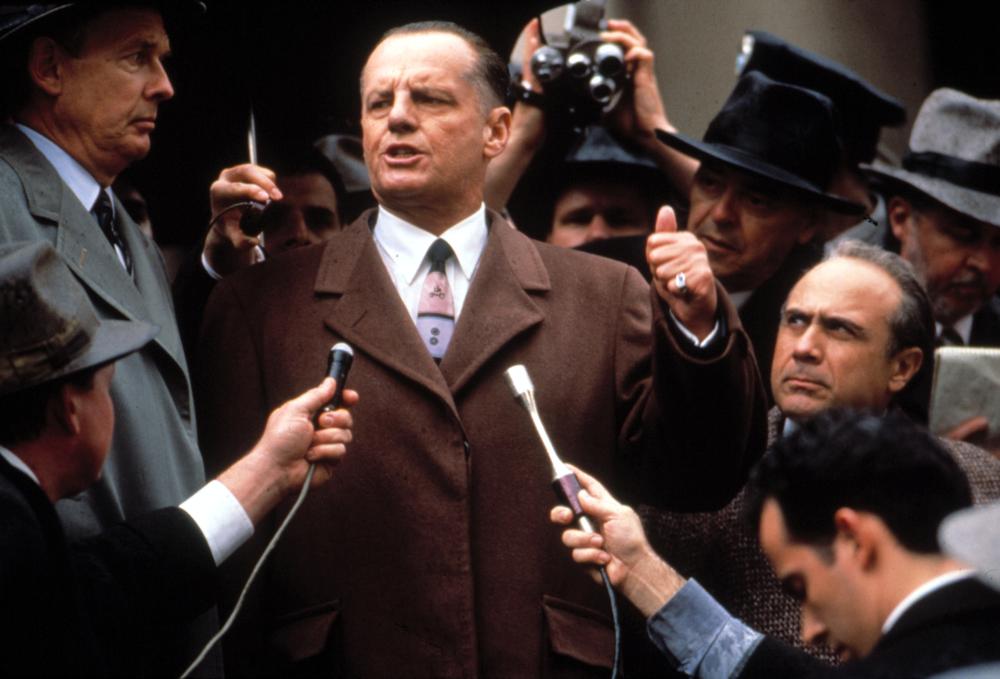
Danny DeVito’s sprawling biographical epic about labor union leader James R. Hoffa is deeply underrated. The iconic figure’s ultimate disappearance has never been solved and has become the stuff of legends and even jokes, such as in “Bruce Almighty”. The subject is still of interest to filmmakers, most notably Martin Scorsese, who is apparently going to adapt “I Heard You Paint Houses”, which, according to experts, includes the most possible explanation of Hoffa’s eventual tragic demise.
Mamet wrote the screenplay, and again, he doesn’t opt for complete historical accuracy, yet doesn’t paint a black-and-white picture of the historical figure. In the film he’s both glorified and demonized; he’s celebrated as a fighter for the working man, but also a man who wasn’t afraid to make more than a few deals with the devil, including the mob.
Whether or not Hoffa was indeed as passionate for the working man’s plight or more of a stoolpigeon for the mob is highly debatable, but it makes for fascinating viewing.
It’s hard to write a biographical epic and introduce all the important characters that were involved. Thus, Mamet uses Bobby Ciara (played by DeVito himself), an amalgamation of Hoffa’s various associates. Bobby is a working man who gets fired and befriends Hoffa (played by an incredible Jack Nicholson, who called this role as one of his favorites), and follows him on his journey to become a union boss and eventual mob victim.
The friendship between the two is the heart of the film, giving it a boost of warmth and even a few bouts of humor. But Bobby’s character is also used as a symbol for the blue collar worker who finally got a fair shake thanks to Hoffa’s tireless efforts.
The film looks absolutely beautiful; with its sets and costume details, DeVito treats this film as a proper period film. It involves a particularly impressive set piece, with loads of extras fighting with each other as strikers and union workers.
The rest of the cast involves Armand Assante as a mob boss; the late great J.T. Walsh as a scheming associate; John C. Reilly in an early role; the late great Robert Prosky in a short but (literally) incendiary role; and Kevin Anderson doing a damn fine Bobby Kennedy impression.
“Hoffa” is a film that deserves to be seen by more people. Even though some claim Nicholson was unfit for the part, both Siskel and Ebert loved his performance. However, the most incredible praise must be from Hoffa Jr,. who visited the set, and upon seeing Nicholson in his Hoffa makeup, started crying, exclaiming “that’s my dad.” The son had not seen his father for more than 17 years, and for just a moment, he believed he was there with him again.
7. Redbelt
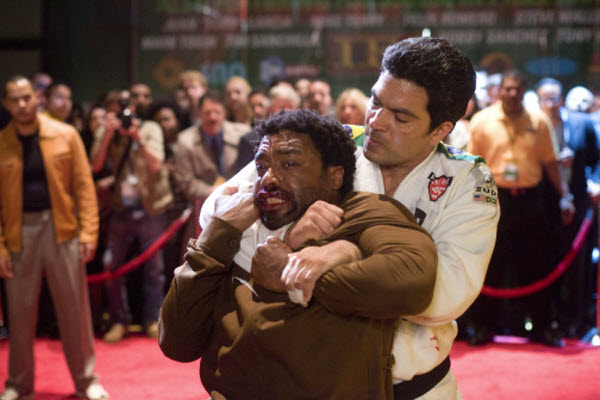
When Mamet moved to Los Angeles, his friend Ed O’Neill (yes that one) implored him to meet the Gracies, a family known from their developments in Brazilian Jiu-jitsu. Mamet started training on his first day there and became fascinated by the world of martial arts. Six years later, “Redbelt” was released, a film about a noble martial-arts fighter dealing with the corrupt world around him, and we have largely Al Bundy himself to thank for that.
The noble warrior is played by the brilliant Chiwetel Ejiofor, who would later receive great acclaim (as well as nominations) for his lead role in “12 Years a Slave”. The Shakespearean actor spent five months training for the part and it shows onscreen during the various fight scenes. He plays good-hearted mixed-martial instructor Mike Terry, whose life begins to change when a distraught woman (Emily Mortimer) appears at his dojo.
The set of circumstances that pull Mike into a corrupt martial arts competition is a typical Mamet head-scratcher, and you might need to see it a few more times to fully understand it.
Even so, the confusing plot is filled with a great supporting cast, including Tim Allen (of all people) as a fading action star; Alicia Braga as Mike’s wife; and a host of Mamet regulars, such as Joe Mantegna, Rebecca Pidgeon, and naturally Ricky Jay. The rest of the cast is filled with martial arts figures such as Randy Couture, Enson Inoue, and the great Dan Inosanto, who fans might know as both the teacher and student of Bruce Lee.
What makes the film great apart, from the dialogue and the realistic fight scenes, is Ejiofor’s turn as Mike Terry. He isn’t following his code of honor out of religious or vanity sense, but because he believes it’s the right thing to do, and Ejiofor conveys that beautifully.
The film ends on a particular moving note, which wouldn’t have worked as well were it not for his performance. Mamet wanted to make a modern samurai film and it certainly is one, but it’s one that’s filled with his standard verbal poetry. It’s Mamet’s passion for martial arts that shines throughout the film, making this one of the best of its genre in the last decade.
6. The Edge
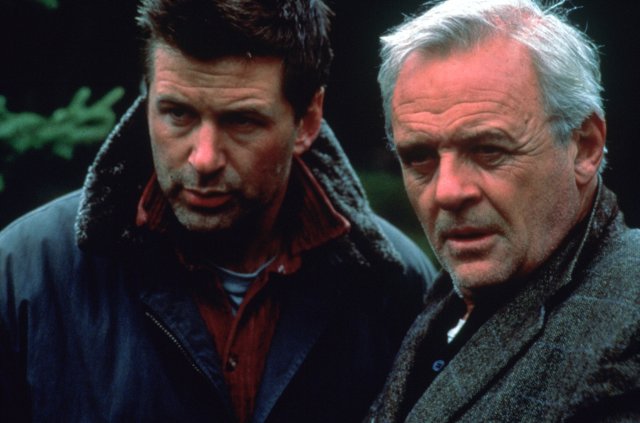
“The Edge” was initially called “Bookworm”, and it’s not hard to see why, as the hero of the film survives the Alaskan wilderness thanks to his extensive literary knowledge.
The role of the titular bookworm was originally offered to Robert De Niro and Dustin Hoffman, but after seeing the film, it’s hard to imagine anyone else playing the part than Anthony Hopkins. He plays introverted billionaire Charles Morse, who travels to a remote cabin in the Alaskan wilderness, where his young and attractive wife (Elle Macpherson) is doing a photoshoot.
Charles is a man who prefers to be alone, knowing that the people around him love him for what he has rather than who he is. He nearly finds kinship with the cabin’s owner Styles (L.Q. Jones), but finds out quickly that he wants an investment for a vacation resort. He also suspects that the head photographer, Robert (Alec Baldwin), has designs for his wife. When Robert sees a picture of a local hunter, he demands to use this person for the photoshoot.
As they fly to this man’s location, a flock of birds causes the plane to crash, leaving only Charles, Robert, and Stephen (Harold Perrineau of “Oz” fame) alive and lost in the Alaskan wilderness. If that isn’t troubling enough, a malicious bear (Bart the bear) begins to hunt them.
One of the stars of the film is definitely Bart the bear, who has appeared in numerous films over the years, including “Legends of the Fall”, an earlier Hopkins vehicle. The great bear sadly died in 2000, but “The Edge” might feature his standout performance. You can naturally observe when the actors are replaced by stuntmen when the bear gets too close, but it doesn’t make it any less impressive.
Mamet has always had a deep respect for strong individuals, and this shines through most of his work, whether it’s a delta force soldier, a martial arts instructor, or in this case, a lonely bookworm. Mamet believes in the myth of the self-made man, something he espouses not only in his political philosophy but in his art as well. Charles Morse is this self-made man; a man who has worked for everything he has, and had to pay for the price of loneliness.
Characters cling on him for help, calling out his name anytime there’s danger. What’s beautiful about the character is that he doesn’t think twice about helping them, even if he has all the right to be cynical about human nature. He’s a character so lonely that he tries to save the life of a man who slept with his wife and aimed to kill him. It’s his melancholy and loneliness that Hopkins beautifully portrays without saying a single word; his fragile eyes tells you all you need to know.
Giving the character such quiet dignity, this film could not have come close to its greatness, were it not for Hopkins’s incredible performance. In particular, in the final scene, he shows one of his greatest pieces of acting, delivering Mamet’s line, “they died saving my life”, with heartbreaking perfection.